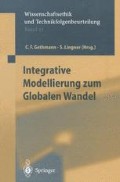Zusammenfassung
Es sei dahingestellt, ob die Welt komplexer geworden ist oder ob wir ihre Komplexität zunehmend besser erkennen. In jedem Fall besteht inzwischen Konsens darüber, dass viele Probleme nur noch mit den einzelnen Disziplinen übergreifenden Ansätzen adäquat analysiert werden können. Bis in die Forschungsforderung hinein wird heute erwartet, dass die Forschung handlungsorientiert die komplexen Zusammenhänge des Globalen Wandels untersucht und dabei interdisziplinäre und integrative Ansätze wählt (BMBF 2001).
Access this chapter
Tax calculation will be finalised at checkout
Purchases are for personal use only
Preview
Unable to display preview. Download preview PDF.
Literatur
BMBF (2001) Forschung zum Globalen Wandel — Wissen für die Zukunft der Erde. Bundesministerium für Bildung und Forschung, Bonn, Juni 2001
Deke O, Hooss KG, Kasten C, Klepper G, Springer K (2001) Economic Impact of Climate Change: Simulations with a Regionalized Climate-Economy Model. Kiel Working Papers No. 1065, The Kiel Institute of World Economics
Grunwald A (1999) Transdisziplinäre Umweltforschung: Methodische Probleme der Qualitätssicherung. TA-Datenbank-Nachrichten 8: 32–39
Hooss et al (2000) A Nonlinear Impulse Response Model of the Coupled Carbon Cycle-Ocean-Atmosphere Climate System (NICCS). Climatic Dynamics, in print
Klepper G, Springer K (2000) Benchmarking the Future: A Dynamic, Multi-Regional, Multi-Sectoral Trade Model for the Analysis of Climate Policies. Kiel Working Paper, No. 976, The Institute of World Economics, Kiel
Kurtze C, Springer K (1999) Modelling the Economic Impact of Global Warming in a General Equilibrium Framework. Kiel Working Paper, No. 922, The Institute of World Economics, Kiel
Leimbach M et al (2000) ICLIPS — Integrated Assessment of Climate Protection Strategies: Political and Economic Contributions. Research Report 29641815 Potsdam Institute for Climate Impact Research
Mittelstraß J (1998) Die Häuser des Wissens. Suhrkamp Frankfurt
Nordhaus WD (1994) Managing the Global Commons: The Economics of Climate Change. Cambridge, MA
Nordhaus WD, Zili Y (1996) A Regional Dynamic General-Equilibrium Model of Alternative Climate-Change Strategies. American Economic Review 86(4): 741–765
OECD (1998) Economic Modelling of Climate Change. Paris
Prinn RG et al (1998) Integrated Global System Model for Climate Policy Assessment: Feedbacks and Sensitivity Studies. Report No.36. MIT, Cambridge MA
Schellnhuber H-J (1999),Earth System ‘Analysis and the Second Copernican Revolution. Nature 402: C19–C23
Springer K (1998) The DART General Equilibrium Model: A Technical Description. Kiel Working Paper, No. 883, The Institute of World Economics, Kiel
Springer K (2001) Climate Policy in a Globalizing World: CGI-Model with Capital Mobility and Trade. Kieler Studie. Springer Verlag, Forthcoming
Tol RSJ (1996) The Damage Costs of Climate Change: Towards a Dynamic Representation. Ecological Economics 19: 67–90
Tol RSJ (1999) The Marginal Costs of Greenhouse Gas Emissions. The Energy Journal 20: 61–81
Editor information
Editors and Affiliations
Rights and permissions
Copyright information
© 2002 Springer-Verlag Berlin Heidelberg
About this chapter
Cite this chapter
Klepper, G. (2002). Integration von natur- und sozialwissenschaftlichen Modellen. In: Gethmann, C.F., Lingner, S. (eds) Integrative Modellierung zum Globalen Wandel. Wissenschaftsethik und Technikfolgenbeurteilung, vol 17. Springer, Berlin, Heidelberg. https://doi.org/10.1007/978-3-642-55979-2_3
Download citation
DOI: https://doi.org/10.1007/978-3-642-55979-2_3
Publisher Name: Springer, Berlin, Heidelberg
Print ISBN: 978-3-642-62789-7
Online ISBN: 978-3-642-55979-2
eBook Packages: Springer Book Archive

